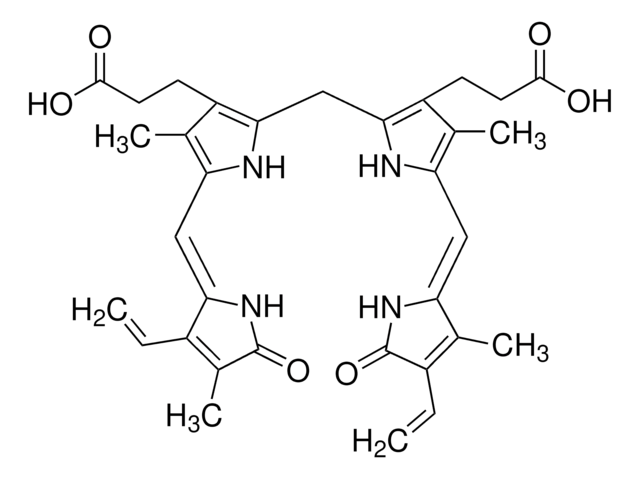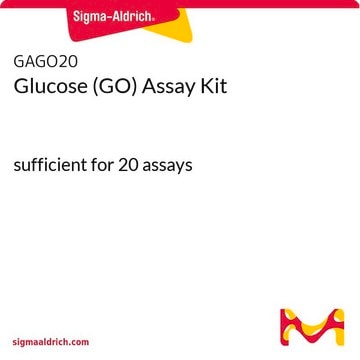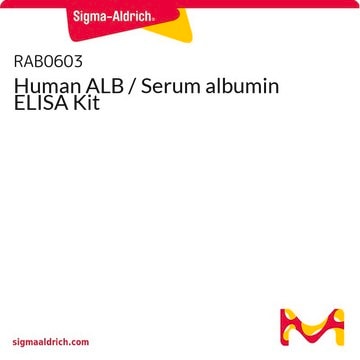MAK126
Bilirubin Assay Kit
sufficient for 180 colorimetric tests
Synonym(s):
Hematoidin Assay Kit
Sign Into View Organizational & Contract Pricing
All Photos(1)
About This Item
UNSPSC Code:
12161503
NACRES:
NA.84
Recommended Products
usage
sufficient for 180 colorimetric tests
detection method
colorimetric
relevant disease(s)
hematological disorder; gastrointestinal diseases
storage temp.
2-8°C
General description
Bilirubin, also known as hematoidin, is a degradation product formed as a result of heme catabolism in the liver. Bilirubin circulates in the blood stream as either the unconjugated insoluble form (indirect bilirubin) or the soluble glucuronide-conjugated form (direct bilirubin). Conjugated bilirubin moves from the bile canaliculi of the liver to the gall bladder where it is excreted into the small intestine during digestion. High levels of bilirubin can result in jaundice and may indicate liver disease, blood disorders, or blockage of the bile ducts.
Application
Bilirubin Assay Kit has been used to measure the total bilirubin concentration in samples.
Features and Benefits
Compatible with high-throughput handling systems. Can be adapted for use with cuvettes.
Suitability
Suitable for the detection of of both total and conjugated bilirubin in serum and plasma samples.
Principle
This assay, based on the Jendrassik-Grof method, utilizes the reaction of bilirubin with diazotized sulfanilic acid resulting in a colorimetric product measured at 530 nm, proportionate to the bilirubin present in the sample. This assay kit measures both total and conjugated bilirubin.
Storage Class Code
12 - Non Combustible Liquids
Flash Point(F)
Not applicable
Flash Point(C)
Not applicable
Certificates of Analysis (COA)
Search for Certificates of Analysis (COA) by entering the products Lot/Batch Number. Lot and Batch Numbers can be found on a product’s label following the words ‘Lot’ or ‘Batch’.
Already Own This Product?
Find documentation for the products that you have recently purchased in the Document Library.
Customers Also Viewed
Morgane M Thibaut et al.
Journal of cachexia, sarcopenia and muscle, 12(1), 70-90 (2020-12-23)
Cancer cachexia is a debilitating metabolic syndrome contributing to cancer death. Organs other than the muscle may contribute to the pathogenesis of cancer cachexia. This work explores new mechanisms underlying hepatic alterations in cancer cachexia. We used transcriptomics to reveal
Ji-Yoon Kim et al.
BMB reports, 53(3), 148-153 (2019-08-14)
Erythropoietin and iron have individually shown beneficial effects on early-phase liver regeneration following partial hepatectomy (PHx); however, there are limited data on the combined effect on late-phase liver regeneration after PHx. Here we examined combined effects of recombinant human erythropoietin
Zhi-Ming Ding et al.
Frontiers in pharmacology, 9, 410-410 (2018-05-17)
Understanding of the temporal changes of hepatic lesions in the progression and regression of non-alcoholic steatohepatitis (NASH) is vital to elucidation of the pathogenesis of NASH, and critical to the development of a strategy for NASH pharmacotherapy. There are challenges
Kimberly J Jasmer et al.
Pigment cell & melanoma research, 33(6), 850-868 (2020-06-20)
Biosynthesis and degradation of heme, an iron-bound protoporphyrin molecule utilized by a wide variety of metabolic processes, are tightly regulated. Two closely related enzymes, heme oxygenase 1 (HMOX1) and heme oxygenase 2 (HMOX2), degrade free heme to produce carbon monoxide
Bin Dong et al.
Journal of lipid research, 58(2), 350-363 (2016-12-13)
The farnesoid X receptor (FXR) plays critical roles in plasma cholesterol metabolism, in particular HDL-cholesterol (HDL-C) homeostasis. Obeticholic acid (OCA) is a FXR agonist being developed for treating various chronic liver diseases. Previous studies reported inconsistent effects of OCA on
Our team of scientists has experience in all areas of research including Life Science, Material Science, Chemical Synthesis, Chromatography, Analytical and many others.
Contact Technical Service





